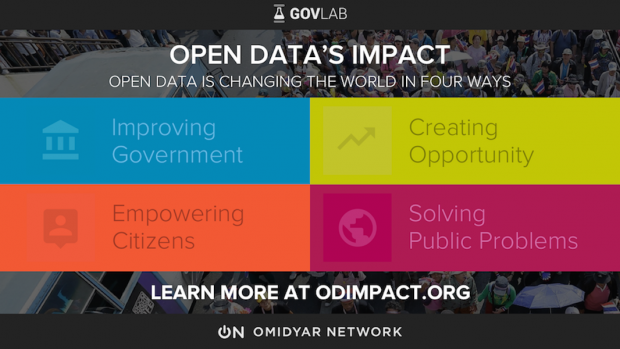Open Data Is Changing the World . . .
. . . and NYU’s GovLab Has the Proof

Open data—in other words, data that can be freely used, re-used, and redistributed by anyone—is gradually bringing about social and economic transformation around the globe. NYU’s Governance Lab (GovLab), in collaboration with the Omidyar Network, set out to document that phenomenon, and they’ve posted a first batch of resulting case studies on a new website, Open Data’s Impact. A second batch of case studies and a paper describing key findings across the case studies will be released over the next two months.
Taken as a whole, the studies provide a good understanding of the impact open data can have.
Open data is improving government by exposing corruption, increasing transparency, and enhancing public services and resource allocation.
Brazil’s public systems have long been hotbeds of corruption and inefficiency, with one report infamously asserting that only a single politician in the entire Brazilian state of Rio de Janeiro had never been in trouble with the law. Brazil’s Open Budget Transparency Portal, launched in November 2004 by the country’s Office of the Comptroller General, has played a key role in increasing the country’s fiscal transparency and now receives an average of 900,000 unique visitors each month. The portal has inspired similar efforts among other offices and agencies, and while the country still suffers regular corruption scandals, it marks a large step in the right direction.
Corruption has also been a long-standing problem in Slovakia, especially in the area of public procurement. In January 2011, Slovakia introduced a regime of unprecedented openness, requiring that all documents related to public procurement (including receipts and contracts) be published online, and making the validity of public contracts contingent on their publication. These reforms appear to have had a dramatic effect on corruption and, equally important for the business climate, perceptions of corruption. More generally, they are among the chief pillars of an effort—within Slovakia and the European Union at large—to reform governance and make it more responsive, transparent and efficient.
Open data is empowering citizens to take control of their lives and demand change.
Kawal Pemilu (meaning “guard the election”) was launched soon after Indonesia’s 2014 presidential elections, which were extraordinarily contentious and widely suspected of being rigged. Thanks to the efforts of an international group of technologists, activists, and some 700 volunteers, within just two days the original, handwritten forms from the polls had been digitized to ensure legibility and posted on a new website so that citizens could compare those tabulations with the official (and disputed) vote tallies. The site required a monetary outlay of just $54, but the results were invaluable: increasing public confidence in the official tallies, helping ease Indonesia’s important democratic transition, and proving that concerned citizens working together can fuel meaningful change.
Mejora Tu Escuela is an online platform that provides Mexican citizens with information about school performance, helping parents choose the best option for their children, empowering them to demand higher-quality education, and giving them the tools to get involved in their children’s schooling. It also enables school administrators, policymakers and NGOs to identify areas requiring improvement, thus raising the overall quality of education in Mexico. While the organizers of the site have faced numerous challenges—including gaining access to the data and ensuring its reliability—it attracts more than 40,000 visitors a day.
The next batch of case studies that will be released on Open Data’s Impact will focus on how open data is:
- Creating new opportunities for all by fostering innovation and promoting education and job creation.
- Playing an increasingly important role in solving major public problems by inspiring citizen engagement and allowing for targeted interventions and enhanced collaboration.
Follow @thegovlab and #odimpact for more details on future releases.




